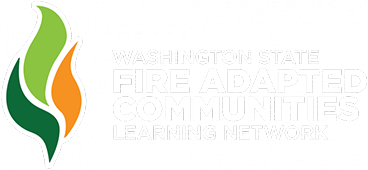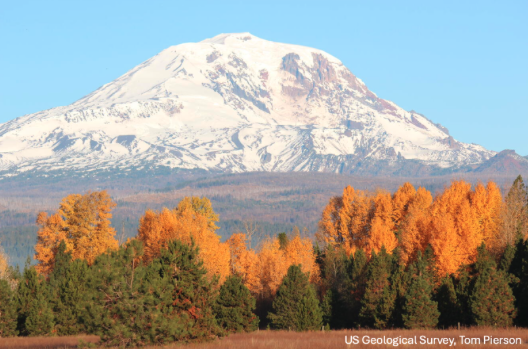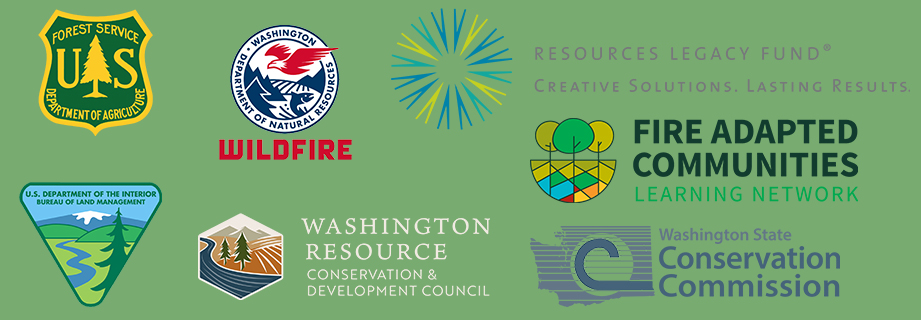The approach to business resilience in the Leavenworth area has evolved over the several years and is grounded in the belief that all segments of a community should know their risk and take action to better prepare for, respond to, and recover from wildfire. This Fire Adapted Community approach, when coupled with financial support from the National Fire Adapted Communities Learning Network and more recently, the Washington State Department of Commerce, has enabled both the Chumstick Wildfire Stewardship Coalition and the Washington State Fire Adapted Communities Learning Network to take steps to increase local business resilience.
In the beginning (late 2013 and early 2014), small meetings were convened by the Chumstick Wildfire Stewardship Coalition (CWSC) and held with business owners in the downtown core to discuss wildfire risk, business impacts, and business needs. The product of these early meetings was a basic business resilience framework (Table 1) identifying risks and mitigations before, during and after wildfire. It is important to note that this framework was largely completed by tourism-based businesses. Agriculture is notably absent. In the future, a more thorough risk assessment and framework should be completed for all sectors within the community. This assessment doesn’t have to be complicated though! The initial assessment was completed on flip charts over the course of several meetings.
With the basic outline of mitigation opportunities identified jointly with the business community, the CWSC began a small program to build business resilience. The program was small in part because of limited capacity (lack of staff time and lack of funds) and a lower priority rating than the core CWSC work of fuel reduction and home hardening.
Initial activities focused on the “easy wins.” In particular, the business community wanted to see improved communication (from fire managers to the business community as well as an enhanced ability to give information out to visitors and guests). The resulting business resilience “cards” that were developed had visitor information on the front (websites, links and phone numbers) and business continuity information on the back. These cards were distributed two weeks prior to the start of the Chiwaukum Complex wildfire in 2014 and were well-received. A letter was developed for incoming Incident Management Teams that highlighted community specific concerns and the Chamber of Commerce Director was heavily involved in the daily Incident Management Team cooperator’s meetings.
In the spring of 2015, Hilary Lundgren designed and hosted a Business Resilience Workshop in Leavenworth. This workshop brought business owners impacted by the 2014 Carlton Complex Wildfire to Leavenworth to share first-hand experiences and lessons learned. These stories were followed by a CWSC-curated packet of basic business continuity planning resources. The CWSC reciprocated by traveling to Winthrop and presenting a business continuity workshop to several business owners and non-profits in the Twisp/Winthrop area.
A similar exchange is underway for 2016. Annie Schmidt with Washington Fire Adapted Communities and Kirsten Cook with the Okanogan Conservation District taught a three-hour workshop hosted by the Winthrop Chamber of Commerce designed to stimulate in-depth business continuity planning (and begin working through critical business functions). Later this spring, Julie Muylaart with the Winthrop Chamber of Commerce will again travel to the Leavenworth area to share lessons and best practices. The CWSC has also participated in workshops hosted by the North Central Washington Economic and Development District to help small business owners learn how to support fire preparedness and relief efforts through government contracts.
In addition to the programs outlined above, the CWSC collaborates with partners and incoming Incident Management Teams to offer businesses programs more in-line with traditional wildfire preparedness efforts:
- Structure assessments
- Firewise landscape plans
- Development of key media messages to reduce the impacts of fire on our business community
- Assistance with cost-share applications
Challenges we have encountered (in no particular order!):
- Lack of funding for business resilience work. While some of our Fire Adapted Communities Learning Network funds have been brilliantly flexible, much of the wildfire preparedness funding currently available focuses on landscape preparation.
- Lack of expertise. We are learning too! Wildfire and community adaptation is very much a part of our scope, but the intricacies of business operations has been something we have had to work through. Our approach has focused on highlighting the problems, sharing lessons clearly learned over the past few Washington fire seasons, and pointing businesses to more in-depth resources for their own customization and use.
- Business Community Engagement. The most success occurred when the outreach was from a business owner or Chamber member “championing” the program to other businesses. Joining the Chamber of Commerce was a good investment and began relationship building.
Lessons learned:
- There is power in sharing. Having an exchange of information between businesses and communities impacted by wildfire has been extremely impactful and useful. While we are not business experts, other business owners are and having them share what they know works best when coupled with a selection of available resources.
- Communication is imperative. Communication to the business community during a fire, within the business community and from the business community to the public at large.
- Working in the business community also means supporting the business community. The CWSC hosts business resiliency workshops events at local businesses and works with local businesses to offer food/drinks/advertising in support of our efforts. In 2015, 18 businesses supported a week of events during CWSC’s Wildfire Prep Week. Though not all were able to attend workshops, they were engaged.
- Agriculture-related businesses (orchards, packing sheds, cattle operations, and yes, even Marijuana growers) have different needs than tourism-based businesses. The functions critical to their continued operation are different in significant ways and presentations should be tailored specifically to these sectors.
- Small business in small towns is big business. Business continuity matters and should not be overlooked as part of a community’s work to live better with wildfire.
Resources utilized during program design:
- Ready Business Mentoring Guide
- Open For Business – EZ by the Insurance Institute for Business and Home Safety
- www.PrepareMyBusiness.org
Materials available for sharing and shameless plagiarism:
- Chumstick Wildfire Stewardship Coalition Website – Business Section
- Business Resilience Card
- Business Preparedness Action Guide (1 page form for businesses to fill out)
- After the Fire Business Resilience One-Pager
- Business Resilience PowerPoint
- Agendas for Resilience workshops
- PowerPoint scenario to reinforce planning process
- Curated packet of handouts for businesses (a collection of what we liked and thought worked best from a number of different programs)





